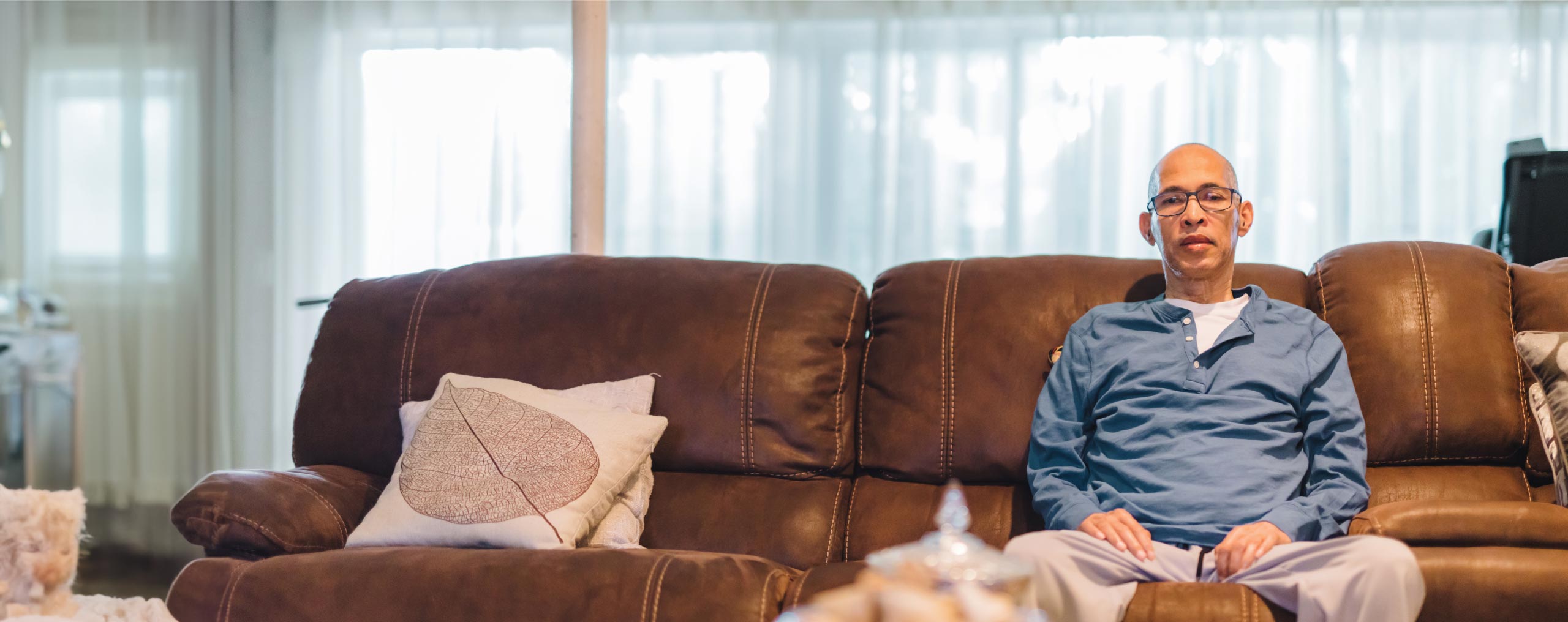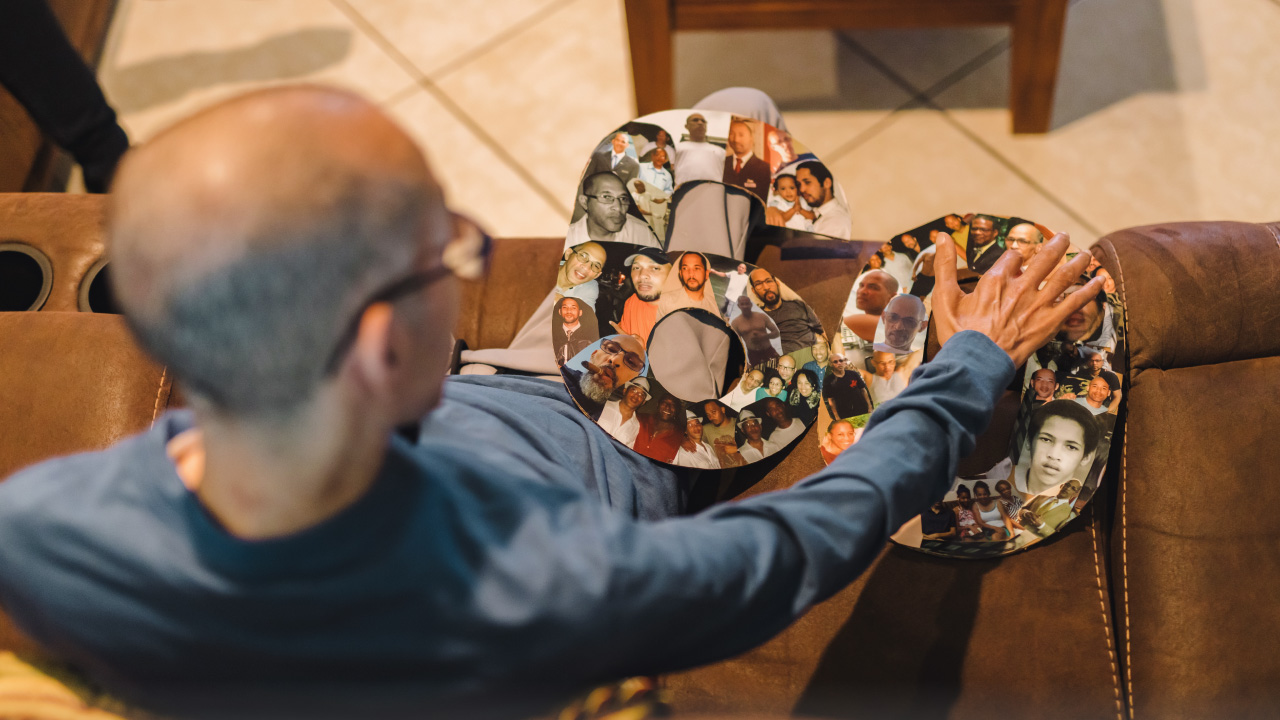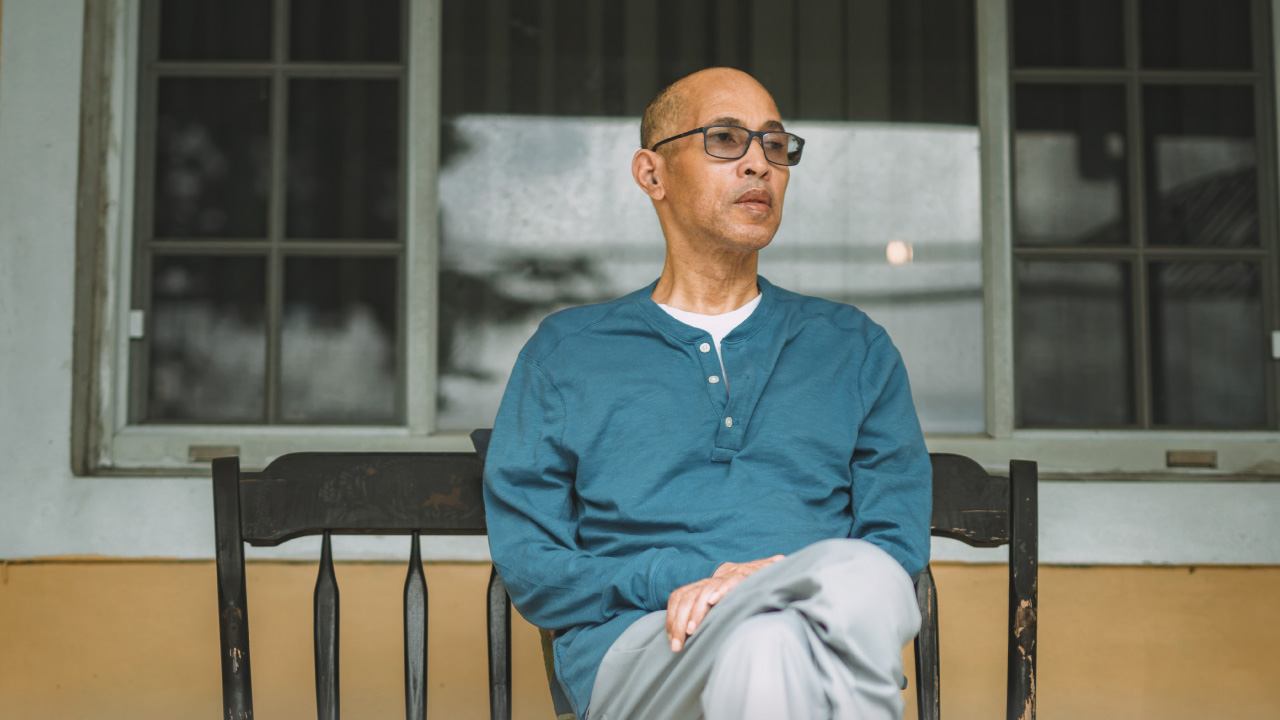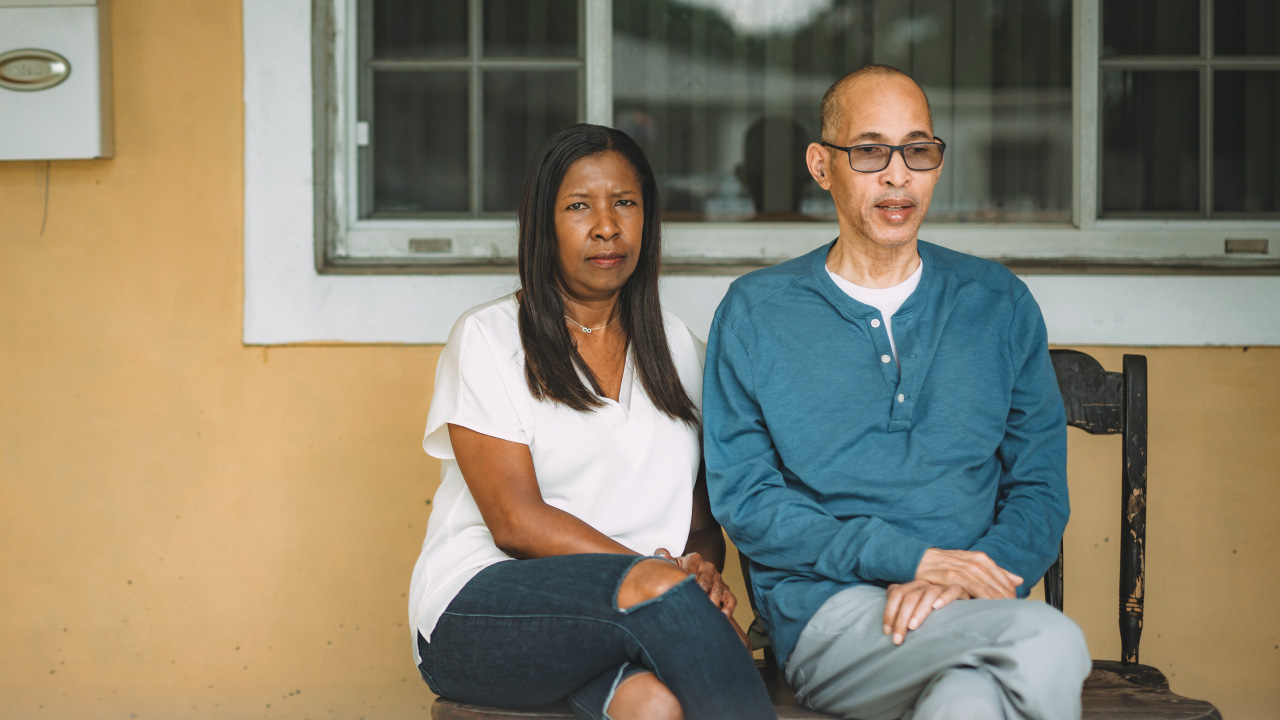Milton | Living with ATTR Amyloidosis with Cardiomyopathy
North Miami, FL
When I think about memories, I smile. My memories keep me going.
Milton recently celebrated his 60th birthday, a personal milestone, and a moment to reflect on his life and those he loves dearest. He was born in Kingston, Jamaica, only one month after the country claimed its independence from Britain. He later migrated to the U.S. as a teenager and eventually made a home in Florida, where he started a family. His two children, a son and daughter, are fully grown now, living on their own, and he became a proud grandfather seven years ago when his daughter gave birth.
He supported his family by working as a funeral director in Miami for more than 30 years. “I enjoyed working,” he says from an armchair at his current residence in North Miami. “I didn’t know how much I enjoyed it until I had to stop. Once you can’t do it anymore, it’s a problem.”
Nearly 10 years ago, Milton was opening the gate to the funeral home when he noticed a strange feeling in his hands: a “tingling” sensation which seemed unremarkable at first, but began to increase in frequency and pain. For someone who worked with his hands, it became a major hindrance. “It kept getting worse and worse,” Milton describes. “It felt like someone was cutting me with a knife from the inside.”
Additionally, Milton started to feel tired and sluggish at work, and would find himself simply exhausted, needing to lie down during the day to rest. What he didn’t know yet was that he was experiencing the onset of a rare hereditary disease.
Milton lives with transthyretin amyloidosisAlso known as ATTR amyloidosis. A rare genetic disease caused by accumulation of misfolded transthyretin (TTR) protein, which affects the nerves, heart, kidneys and eyes. Patients can develop amyloidosis by inheriting the faulty TTR gene from a parent (hereditary ATTR amyloidosis, ATTRv or hATTR) or due to a natural form of this protein, without genetic mutation (wild-type ATTR amyloidosis, ATTRwt or wtATTR). NTLA-2001, Intellia’s first investigational therapy, is being evaluated in a Phase 1 clinical trial as a treatment for people who have hereditary ATTR with polyneuropathy., or ATTRAlso known as ATTR amyloidosis. A rare genetic disease caused by accumulation of misfolded transthyretin (TTR) protein, which affects the nerves, heart, kidneys and eyes. Patients can develop amyloidosis by inheriting the faulty TTR gene from a parent (hereditary ATTR amyloidosis, ATTRv or hATTR) or due to a natural form of this protein, without genetic mutation (wild-type ATTR amyloidosis, ATTRwt or wtATTR). NTLA-2001, Intellia’s first investigational therapy, is being evaluated in a Phase 1 clinical trial as a treatment for people who have hereditary ATTR with polyneuropathy., a condition in which transthyretin (TTR) proteins become misfolded and build up in various parts of the body, impacting critical organs and the nervous system. “My heart is damaged by the disease, because the amyloids are deposited in my atrium,” Milton explains. “I get tired real easy, because my heart isn’t squeezing blood like it’s supposed to.”
This amyloid buildup has led to cardiomyopathyTransthyretin (ATTR) amyloidosis resulting in heart muscle disease, and manifested through symptoms that include shortness of breath, palpitations and abnormal heart rhythm, ankle swelling (edema), fainting, fatigue and chest pain (angina). Can also lead to heart failure., a disease that prevents Milton’s heart from properly circulating blood throughout his body. Combined with polyneuropathyTransthyretin (ATTR) amyloidosis resulting in severe and permanent peripheral nerve damage, and manifested through symptoms that include tingling and numbness in legs and feet, difficulty walking, limb weakness and pain. Polyneuropathy is also known as peripheral neuropathy. — the nerve-pain Milton was experiencing in his hands — the disease has forced him to retire. He once considered himself fit and healthy. He was an amateur bodybuilder for a period of time, but now, with his cardiomyopathy advancing, it is difficult for him to do physical activity.
It took several years to get a correct diagnosis, something Milton feels is due to a lack of disease awareness. “The biggest thing I’ve learned from this is that people need to be educated,” he says. After stepping back from work, Milton began losing weight rapidly. He was deeply concerned and pushed his doctors for real answers.
Sadly, doctors misdiagnosed Milton several times. At one point, he was told he had ALS (arterial lateral sclerosis) and only six months to live. In 2018, on the advice of his nephew (with whom he currently lives), Milton traveled to the Mayo Clinic in Minnesota. Physicians there did a genetic test for ATTR and diagnosed him with the condition. “It took them two days to figure it out,” he says. He also learned one of the genes responsible for ATTR can be traced back generations in Africa, and despite being rare, affects this population with greater frequency.
Milton had assumed there would be a medicine he could take but soon learned there were no curative treatments, only ones aimed at slowing disease progression. Furthermore, it was difficult to get his insurance provider to cover the cost of the expensive medicine. “They recommended me for hospice instead,” Milton says in disbelief.
However exhausted Milton was, he continued to fight. “I have a desire to live,” he says. “I have a strong desire to enjoy the stuff I used to enjoy. Get back to life. Because when you’re healthy, you might not appreciate it, but when it’s taken away from you, it’s like being in a prison. That’s how I feel: like I’ve been in prison for the past 10 years.”
Debbie sits next to Milton on the bench of the front porch, talking with him about upcoming appointments. Her presence puts Milton at ease. Debbie has become an important caregiver and dear friend, helping Milton do things around the house and making sure he gets the best care possible. “She is my guardian angel,” Milton says. His appreciation for her clearly stretches beyond words. “Sometimes I don’t know how she does it.”
Milton eventually convinced his insurance to cover costs for the infusion, which he receives every three weeks. Debbie takes him to his appointments at the hospital and monitors his condition at home afterwards. Although the treatment improved Milton’s outlook, he was later confronted with yet another health challenge.
In 2022, Milton was diagnosed with Stage III colon cancer and underwent surgery to remove part of his colon. Soon, he will start chemotherapy. “Now I’m fighting on two fronts. I’m at war… I don’t want to be in a wheelchair. I don’t want to be in the bed, so I keep moving and moving.”
Milton’s analogies to fighting a war with his health are likely a result of the years he spent in the U.S. Army, serving overseas after graduating high school in the Bronx. The discipline and resilience he learned in the Army live on in his approach to managing his health. Milton uses his time to research new medicines that will hopefully help him and others in similar situations.
When Milton learned about CRISPRAdapted from a naturally occurring bacterial immune system, CRISPR is an acronym for Clustered Regularly Interspaced Short Palindromic Repeats. One of the proteins in the CRISPR system is known as CRISPR-associated 9 protein or Cas9 protein, which acts as a pair of ‘molecular scissors’ to cleave DNA. Researchers have co-opted the bacterial CRISPR system to make specific changes in the DNA of humans, other animals and plants. CRISPR was first harnessed in 2012 as a genome editing tool in the lab. More recently, scientists have begun engineering and testing CRISPR systems to be very specific to a desired genetic target. and gene editingAlso called genome editing. Gene editing collectively refers to a set of technologies, including CRISPR/Cas9, that can be used to cut and modify DNA. Gene editing uses systems to make the DNA change inside the cell. These cells can be edited in the body (in vivo) or outside the body (ex vivo) from a patient or donor. technologies, he saw hope for the first time in a new treatment that could actually address the root cause of the disease. “You need to go to the DNAAcronym for deoxyribonucleic acid, the hereditary material in humans and almost all other organisms. DNA can be found in the cell nucleus and contains the genetic instructions for the development, functioning, growth and reproduction of all known organisms. Nearly every cell in a person’s body has the same DNA. level,” he says. He cannot over-stress the importance of this work, and what it means to him.
Now, Milton fights not only for his life, but also for others who find themselves in similar situations due to ATTR amyloidosis. “I would like to create awareness of this disease. Even if the treatment doesn’t get to me in time, I don’t want anyone else to go through what I went through for the first five years. If people have symptoms, I want them to be aware that there is a treatment.”
Ultimately, these developments give Milton hope in a situation that often feels hopeless. “When I think about memories I smile,” he says. “My memories keep me going.”
He takes one day at a time and counts small victories when he can. This determination rises from his desire to get back to living. “I would love to take my grandson to a museum. I would love to drive a Mustang. I would love to just drive to places I love. Just live my life. That’s my desire.”






